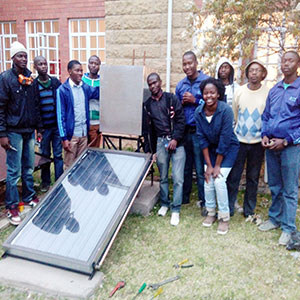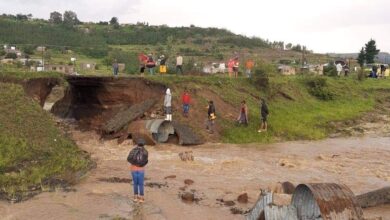NUL wins first price at BIE-COSMOS Expo 2017 in Kazakhstan

The National University of Lesotho (NUL) made headlines again! This time in Kazakhstan! That is where it beat tens of scientific institutions from all over the world to be the sole winner of a prize in the area of “Future Energy.”
NUL demonstrated an innovative unconventional solar energy system that clearly caught everyone by surprise, said Mr Anadola T’siu, the thinker behind the system.
When it all started, the odds were clearly stacked against the School in the Roma Valley. Mr Anadola T’siu was coming face to face with brilliant scientists from all over the world who gathered at the BIE-COSMOS EXPO 2017 in Kazakhstan, showcasing their innovations in a rigorous competition that would last for three months.
In the end, it was the most unlikely that happened—lots and lots of institutions were eliminated, leaving just six competitors including NUL among them; that was good enough. But then, NUL went on to deliver a lasting blow, crashing the last five competitors and emerging as the sole winner! History had been made!
(For the National University of Lesotho International Science, Technology and Innovation Conference and Expo, NULISTICE 2018, submit your abstract to www.nulistice.org.ls, the deadline is extended to 30th September 2017)
No doubt you don’t believe us—do you? We don’t blame you—Mr Ts’iu did not believe it either, “frankly, when I looked at the projects the NUL was up against, I had already given up, so I couldn’t believe it when I saw we were number ONE!”
Well, this sounds more like a story of David and Goliath— how else do you explain how poorly resourced NUL scientists stood their ground up against the best in the world in the area of Future Energy Technologies? It’s called innovation!
But just as the story of David and Goliath is a true story, so is the story of NUL beating the world’s best at the glitzy international expo in Kazakhstan!
The story goes like this. NUL, along with other institutions from Lesotho attended the internationally acclaimed expo, alongside institutions from numerous countries. But, as usual, NUL was there for a different purpose altogether—it was there for a kill. Of course this is not the first time!
You might remember Mr Ts’iu outmaneuvered scientists from all over the world about a year ago and won a second prize in Germany, coming second only to Canada—remember? That system was focused mainly on solving the problems of energy for the poor in electricity-starved rural Lesotho. “Kazakhstan was different,” Mr Ts’iu said. “This time, the idea was to come up with a system that would solve energy problems, not only for rural Lesotho, but “FOR ALL.” Hence the theme, “Energy for All.”
That is, the system had to be good for the rural poor in the South as it was for the urban rich in the North. It had to be just as good for households as it would be for large industries.
Let us, for a minute, quote from the horses’ mouth in Kazakhstan. Dimitri Kerkentzes, Deputy Secretary General of the BIE, showed that NUL project was “a concrete example of the core values of both Expo 2017 Astana and Expo ’90, to promote sustainability and environmental protection.”
Mr. Shinya Kubota of the Expo ’90 Foundation stated: “the National University of Lesotho’s project fully embodies the harmonious coexistence of nature and mankind, the fundamental principle of the Expo ’90 Foundation.”
What is it about this system that has caught the attention of the world’s brightest? Remember the basics of solar water heaters. They are made such that they capture sun’s energy and store it in water, producing water circulation in the absence of electricity. “But our solar water heater system is a bit more advanced, actually it offers three in one,” Ts’iu related comfortably. “It offers traditional water heating for general uses, it offers space heating which includes underfloor heating and wall radiation and it can even generate electricity using smart little known Organic Rankine Cycle technology.”
This is how. Once the refrigerant has been used to produce electricity, it is again cooled. It is cooled with water and the water in turn gets warm (ever heard of heat-exchange?). “Here is the beauty of our system, we don’t throw away that warm water, we use it to warm buildings,” he said. Thus they save every “iota” of energy! And they recycle the refrigerant.
But why not just use the famous photovoltaic solar cells? In cold countries like Lesotho and especially Kazakhstan, solar energy can be very elusive in winter, necessitating the use of numerous batteries with poor life span. “In our case,” Ts’iu said, we store our energy in water in the tanks— tanks are our batteries. Plus tanks are low cost, and they endure for a life time.”
But, if there is still a doubting Thomas in your chest, how about reading this?http://www.bie-paris.org/…/1427-expo-2017-bie-cosmos-prize-….
Yep! That is NUL on the move!






